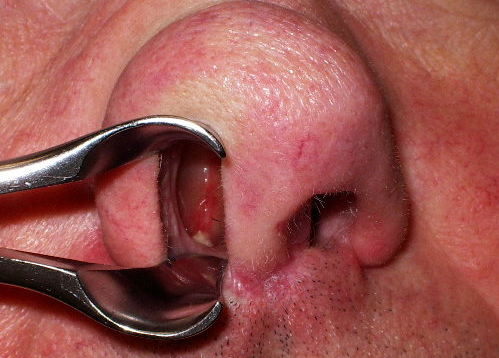Conditions: Nasal Polyps
What are Nasal polyps?
Depiction of nasal polyps.
Nasal polyps are a special case situation in which the nasal lining becomes excessively inflamed and swollen, leading to the formation of fluid-filled sac-like pockets on its surface. These sacs are commonly referred to as inflammatory nasal polyps. Typically, polyps develop gradually on both sides of the nose, obstructing the airway and creating a favorable environment for bacterial sinus infections. While environmental allergies often contribute to polyp formation, they may less commonly arise as a manifestation of an underlying and more severe medical condition.
How are polyps diagnosed?
Nasal polyp
Inflammatory nasal polyps, which are often associated with chronic inflammation of the nasal passages, can be diagnosed through a combination of medical history assessment, physical examination, and diagnostic imaging. The initial step typically involves a thorough discussion with the patient about their symptoms, including reduced nasal airflow, reduced sense of smell, facial pain, environmental allergies, and other symptoms that go along with chronic sinusitis. A physical examination of the nasal cavity is then conducted, during which an Otolaryngologist may visualize the polyps just by looking in the nose or, more commonly, only when using a nasal endoscope. To confirm the diagnosis and assess the extent of the polyps, additional diagnostic imaging techniques like computed tomography (CT) scans may be employed, providing detailed images and helping to rule out other potential causes. Once inflammatory nasal polyps are diagnosed, subsequent evaluation (such as allergy testing) and treatment planning may be undertaken.
What conditions are associated with nasal polyps?
Chronic sinus infection. Nasal polyps tend to promote infection because the polyps block the normal sinus openings, fail to clear mucus and debris normally, and create many small pockets in which bacteria or other organisms may thrive. But not only to polyps promote infection, but infection also promotes formation and growth of polyps. For these reasons, all but the mildest cases of nasal polyps are typically associated with a chronic sinus infection.
Allergies. Environmental allergies seem to underlie and cause the development of polyps in a large portion of individuals with inflammatory nasal polyps. The allergy response is itself an inflammatory process, and as airborne allergens deposit on the lining of the nose and sinuses from breathing, polyp growth may occur.
Asthma. Frequently associated with polyps, asthma is an inflammatory condition of the lower airway..
Cystic Fibrosis. Patients with cystic fibrosis all develop chronic sinusitis, and some of these also develop nasal polyps. When nasal polyps are identified in children, testing for cystic fibrosis is typically undertaken.
What other conditions may appear to be polyps but are not?
Not all growths within the nasal vault and sinuses are polyps.
A patient’s history and physical exam with nasal endoscopy may be sufficient to accurately diagnose inflammatory polyps or perhaps suggest another type of problem. A sinus CT is often undertaken in the context of suspected polyps, and the CT findings may further support this diagnosis or suggest otherwise.
After imaging has been completed, a biopsy may be undertaken to more definitively diagnose inflammatory polyps versus something else.
Other possibilities include:
Nasal tumors, of which there are many types, some benign and others malignant (cancerous).
Granulomatosis with polyangiitis (formerly known as Wegener's granulomatosis), an autoimmune disease associated with recurrent sinus infections, along with constitutional symptoms such as weight loss, fever, and joint pain and the sinuses look characteristically “traumatic”
Encephalocoeles, which are sac-like protrusions of the brain and the membranes that cover it through openings in the skull. These are anatomic defects that occur during the fetal stage of development. Encephaloceles may extend into the nose or sinuses or elsewhere, such as on the back of the skull.
Do nasal polyps recur?
Inflammatory nasal polyps, while often requiring surgical intervention for removal, do have a tendency to recur. While the removal of polyps may help re-establish less inflamed and uninfected sinuses, the underlying cause for the polyps, such as allergies or other inflammatory conditions, are not directly treated by surgery and therefore will promote the reformation of polyps. For this reason, a combined strategy utilizing non-surgical methods to slow or even prevent the regrowth of polyps is indicated.
how to get the most from your SINUS appointment
Appointment time is valuable. Here are some suggestions to make the most of your appointment. This preparation will help you and your doctor maximize efficiency and accuracy, freeing up time for questions and answers.
This page











